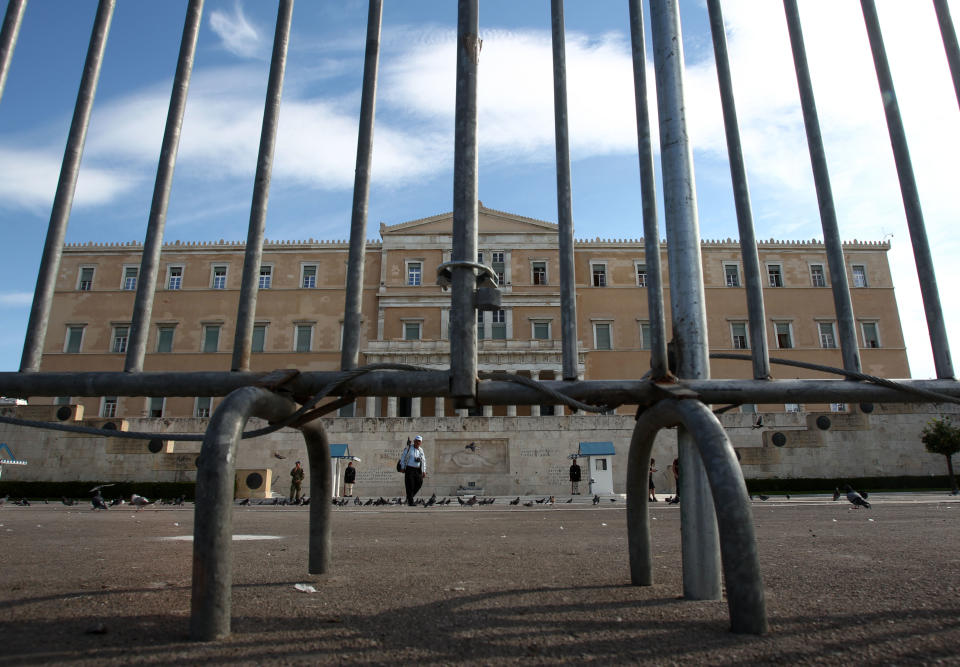Greece: More austerity despite strikes, dissent
ATHENS, Greece (AP) — Greece's conservative-led coalition detailed a new four-year package of austerity measures late Monday, facing down escalating protests by unions and dissent from its left-wing government partners.
The bill, to be voted in parliament late Wednesday, will impose further wage and benefit cuts on Greeks who are heading into a sixth year of recession and are already struggling with 25 percent unemployment.
Unions had already called a 48-hour general strike starting Tuesday in anticipation of the measures.
Police late Monday cordoned off streets around main government buildings in preparation for potentially violent protests.
The drastic spending cuts and tax hikes demanded by the country's bailout creditors aim to save some €13.5 billion ($17.3 billion) in 2013-14, but austerity will be extended through 2016.
Other measures include a two-year increase in the retirement age to 67, a new round of tax increases, and making it easier to fire and transfer civil servants.
If lawmakers reject the measures, Greece could lose vital rescue loans that have kept it afloat since May 2010 — raising the threat of bankruptcy and a euro exit.
The next loan installment of €31.5 billion out of a total of €240 billion is already overdue and without it, conservative Prime Minister Antonis Samaras has said Greece will run out of euros on Nov. 16.
After nearly three years of successive income cuts and tax hikes, Greeks have little stomach for more.
On Monday, doctors launched a three-day strike that will leave state hospitals functioning on emergency staff, while news broadcasting was canceled by a 24-hour journalists' strike.
During a general strike Tuesday and Wednesday, schools, tax offices and public administration will shut down, and there will be no train or ferry services across the country. Flights will be disrupted for three hours Tuesday.
Since forming his government after June elections, Samaras has fought on two fronts: To persuade debt inspectors from the European Union, International Monetary Fund and European Central Bank to approve the country's €31.5 billion loan installment, and to talk his two center-left coalition partners into backing the necessary spending cuts and labor reforms.
Persuading politicians at home has proved the hardest task. The main Socialist partner in the coalition has agreed to the package, but faces increasing dissent from its own lawmakers.
And the smaller Democratic Left party says it will not support the bill because of new labor reforms.
"Our position remains unchanged," Democratic Left leader Fotis Kouvelis said late Monday. "From the outset, we said we would not support these labor reforms."
The coalition government has the support of 175 lawmakers in the 300-member parliament — 127 from conservative New Democracy, 32 from Socialists and 16 from the Democratic Left.
The austerity package only needs a simple majority to pass and the Democratic Left's opposition to the bill does not pose a direct threat to its passage. But approval with fewer than 151 votes would reinforce opposition politicians' argument that Samaras lacks legitimacy.
On Sunday, Samaras warned conservative lawmakers about the risks if the measures are rejected.
While acknowledging Greeks had already lost some 35 percent of their income in the past two years, he added: "We would lose at least twice that amount within a few weeks — about 80 percent of our standard of living" if the country was forced out of the euro.
Opposition leader Alexis Tsipras is demanding elections — although the country has already had two popular votes and four governments in the past year.
His Radical Left Coalition party is leading opinion polls, which have also seen a rapid rise in popularity for the militant far-right Golden Dawn party, which has been linked to violent attacks on immigrants.
On Sunday night, Parliament will also vote on the 2013 state budget, which provides for a sixth year of recession in which the national debt will rise to 189.1 percent of the country's gross domestic product of €194 billion. All three coalition partners are expected to back the budget.






